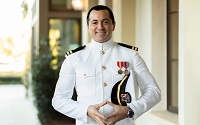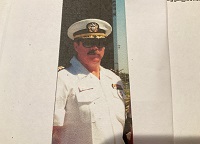The Florida Association of Nurse Anesthesiology (FANA) saluted the military veterans whose selfless service continued as Certified Registered Nurse Anesthetists (CRNAs) in Florida. For many veterans who chose to continue their specialized skill, becoming a CRNA was a natural progression of front-line service after leaving the military. More than 5,400 CRNAs work in all practice settings in Florida including hospitals, health care facilities, and surgical centers.
“I had an opportunity to shadow a CRNA at Wright-Patterson Air Force Base,” said Paul J. Safara, MSNA, CRNA, of Tampa. “I was hooked from that day forward. I admired the level of skill, the level of responsibility, the level of independence, and the reward of caring for these sick surgical patients in their time of need.”
“It takes special Americans to serve in our nation’s military; people willing to serve in critical roles – often in stressful life-or-death situations that provide safety and security,” said FANA President Michelle Canale, DNP, CRNA, APRN, FAANA.
“That passion fuels all of our CRNAs who are dedicated to protecting the health and well-being of Floridians,” added Canale, who is also the Director of the Nurse Anesthesiology Program at the University of South Florida.
Veterans have solid experience, as Certified Registered Nurse Anesthetists practice in every setting in which anesthesia is delivered. They are also primary providers of anesthesia care in rural and medically underserved areas, and on the battlefield in surgical teams, military ships and forward-operating bases.
As expert clinicians with specialized skills in advanced airway and ventilator management, advanced hemodynamic monitoring, and advanced patient assessment, CRNAs have expanded the nation’s critical care workforce, particularly during the COVID-19 pandemic.
Here are a few stories from veterans in Florida who are Certified Registered Nurse Anesthetists, using their experience as sole practitioners in the service to play critical medical roles in communities around the state:
 Jansky, a retired CRNA living in Naples and former president of the American Association of Nurse Anesthesiology, retired as a Lt. Col. after 20 years of service. As a graduate RN in the Veterans Administration, it was a natural choice to serve her country as her grandfathers had during World Wars I and II.
Jansky, a retired CRNA living in Naples and former president of the American Association of Nurse Anesthesiology, retired as a Lt. Col. after 20 years of service. As a graduate RN in the Veterans Administration, it was a natural choice to serve her country as her grandfathers had during World Wars I and II.
A graduate of the U.S. Army School of Anesthesia for Nurse Corps Officers, Jansky also earned a master’s degree from Texas Wesleyan.
She served around the world including Germany, Honduras
Jansky said her time in the military provided many skills she carried to Florida as a CRNA.
“You become the expert because you are all there is, so you need to be competent and confident. This helps with independent practice,” she said. “Also, you find great depth of personal strength: you work until the job is done and the surgeon has taken care of the patient.”
Jansky found her post-military career a different kind of public service and one that is rewarding as well.
“To literally save the life of a mom or baby with a quick induction of general or regional anesthesia … Few careers offer such immediate reward for a job well-done,” she said.
 Duprat, from Orlando, served in the Naval Reserves for ten years with two of those attached the 4th Medical Battalion with the Marine Corps. He left the service as a Lt. Commander.
Duprat, from Orlando, served in the Naval Reserves for ten years with two of those attached the 4th Medical Battalion with the Marine Corps. He left the service as a Lt. Commander.
“I chose to join the military because I felt a calling to serve and provide medical care for the men and women sacrificing for the liberty that we all enjoy every day,” he said. “Once I learned that CRNAs were the most highly trained of all nursing specialties and that the science coursework was extensive, I knew immediately that this was my career path.”
Duprat was on the frontlines in the early days of the COVID-19 pandemic, deployed to New York City as part of the Navy’s COVID Response Team.
He has carried that passion for emergency service to his work as a civilian.
“The amazing thing about being a CRNA is that we get to make a difference in the lives of our patients almost every single day,” said Duprat who provides high-risk obstetrical anesthesia. “It has been humbling to have been part of many teams responsible for saving the lives of dozens of infants.”
 Serving in the Navy was a family tradition for Naggatz who now lives in Gulf Breeze in our state’s Panhandle. He started with a Navy Nurse Corps scholarship near the end of the war in Vietnam and retired as a Navy Commander.
Serving in the Navy was a family tradition for Naggatz who now lives in Gulf Breeze in our state’s Panhandle. He started with a Navy Nurse Corps scholarship near the end of the war in Vietnam and retired as a Navy Commander.
“I chose the anesthesia specialty to better serve my military and eventually all of my surgical patients,” said Naggatz, who recently retired.
He served around the world in support of Navy and Marine Corps missions, including time on aircraft carriers and the USS LaSalle in the Indian Ocean.
“Many of my assignments were served as the sole provider behind the front-line action,” he said.
“I do reflect on how much planning in those situations prepared me for almost any eventuality,” Naggatz said. “My skills in providing regional anesthesia eventually led me to my most rewarding career path, that of providing regional anesthesia to our very busy obstetrical facility.”
 Safara, of Tampa, served for ten years active duty in the United States Air Force, leaving as a Captain.
Safara, of Tampa, served for ten years active duty in the United States Air Force, leaving as a Captain.
After choosing his path as a CRNA at Wright-Patterson Air Force Base, he attended graduate School in Nurse Anesthesiology funded by an Air Force Institute of Technology Scholarship at Virginia Commonwealth University.
He served around the world including in Oman during Desert Shield/Desert Storm.
“In the Air Force we worked independently. While deployed during Desert Storm we were front-line providers in all echelon levels,” he said, adding that the anesthesia team were known as the “Desert Dusters.”
Safara is proud of the service that CRNAs provide around the state and country.
“When you go for surgery most of the time the person doing your anesthesia is a nurse anesthetist,” he said. “Rest assured your CRNA is highly skilled and highly motivated to provide the safest, state-of-the-art, evidence-based anesthesia care available.”
These are just a few stories of Florida veterans continuing service in the community as Certified Registered Nurse Anesthetists.


